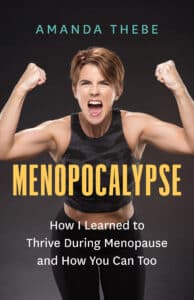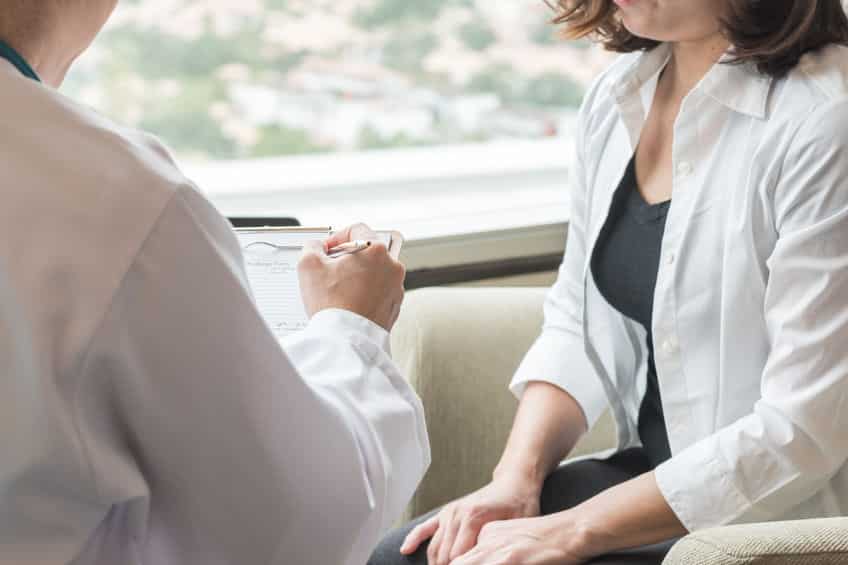All women eventually will experience menopause and with it comes emotional and physical consequences that dwarf anything a man with declining testosterone may encounter. Beyond menopause itself, the process leading up to it (perimenopause) and time after it (postmenopause) can be present for roughly half the average woman’s life. So, it is pretty surprising that the topic is not only rarely discussed but alarmingly underrepresented in medical research fields. Why has menopause been so heavily neglected? And what impact does that have towards the half of Earth’s population who will experience it? WellWell recently sought clarity on these questions by speaking with Amanda Thebe, author of Menopocalypse: How I Learned to Thrive During Menopause and How You Can Too. We chatted on the vast misunderstanding towards menopause and its symptoms, the long and growing demand for more information and why women shouldn’t feel uncomfortable talking about it.
I think a lot of people, especially men, misunderstand and underestimate the physical and emotional toll menopause can have. What are some of the lesser known or lesser appreciated challenges of menopause?
I think that menopause and also its ugly little sister perimenopause are often not generally topics of conversation. We don’t hear about them at school and they’re not spoken about in everyday conversation unlike other health issues. But one of the hardest a things woman may deal with is perimenopause, which is the time leading up to menopause. It can last between 8 and 10 years and a woman may go through a myriad of symptoms without getting to the root cause. Perimenopause can be a very symptomatic period and there’s health considerations that need to be taken into account. However, since there’s so little education on it, people, even women, have a hard time wrapping their heads around it.
Is this lack of information and misguidance a systemic issue?
There’s certainly a demand for the missing conversation and education on the subject. From a personal perspective, I started feeling unwell symptoms that were neurological like depression, migraines and lack of energy in my early forties but there was not one doctor that could identify what was happening. Even though I was clearly not well, they couldn’t identify it. It just happened to be during a routine gynecological appointment when my gynecologist said, “Yep, you’re going through perimenopause. These are very normal symptoms.” I remember asking, “What is perimenopause?” At 43 years old, I had never heard of that word before. I had to go home and Google it. My female friends all had similar experiences.
Menopocalypse was in the top 100 for women’s health books on Amazon months before it was released. Do you think that reflects a demand for more information and clarity on the topic?
Absolutely. For men, it’s so easy to roll your eyes and say, “Here’s something I don’t want to talk about.” But for women, menopause has a direct impact on the second half of their entire life. I think because of this, women want valid information and clarity, we want answers. That’s why I wrote it because I couldn’t find any. There’s a misconception that menopause is simply the time when periods stop and you haven’t had a period in twelve months. That’s the medical definition. But this shows there’s such a big gaping hole in the full picture because in reality you’ve got the 8 to 10 years leading up to that. During this time women are highly symptomatic and struggle with their overall health. They’re left in a situation where they’re more susceptible to other health issues and diseases due to losing the protective element of estrogen in their bodies. We then basically live what is likely half of our entire lives in that place. Nobody talks about it like that.
What are some activities that people may not understand or be informed about that can be impacted by menopause?
It’s an estrogen receptor that’s all over the body. It’s in our brain, it’s in our guts, in our joints – everywhere. While perimenopause tends to be the most symptomatic period, symptoms can linger well into postmenopause. What often happens is a woman will be experiencing symptoms but not necessarily associate it with menopause and her fluctuating hormones because essentially her hormones will continue to dwindle down to nothing. But it doesn’t happen in a linear function, it’s very fluctuating and so a symptom that she may have on a Friday won’t come back ‘til a Tuesday. It can be very confusing and frustrating. These symptoms can range from depression, heightened anxiety, chronic fatigue, joint pain, migraines, hearing problems, visual problems or problems with their GI tract.
How does this wide range of symptoms impact how doctors decide to proceed with treatment?
That’s another huge issue. They’ll go see a doctor and say “why am I so depressed?” or “why can’t I sleep?” and the doctor will just chalk it up to insomnia. Then they’ll prescribe sleeping pills but they’re not treating the root cause, they won’t even consider that this might be because of the time of life that they’re in. It’s also worth noting most doctors don’t have any menopause training at all. It’s not part of medical school. Most gynecologist don’t even have menopause training. It’s estimates only 20 percent of gynecologists go through menopause management during their fellowship. So, we almost feel invisible in the eyes the medical community.
Menopocalypse mentions the benefits of strength training but women too often overlook it due to gender biases. How does strength training help alleviate and combat menopause symptoms?
Obviously, as a strength coach, the training is very important to me but there are few things more helpful towards a woman taking control of her overall health than strength building. It can be super impactful towards osteoporosis, which is directly affected by lack of estrogen. So, by building muscle, we actively promote the stimulus of bone growth. Not to mention, lean muscle and higher levels of muscle mass have been linked to limiting risk of diabetes, heart disease and, of course, obesity. All things we need to look out for as we age.
Do you think misconceptions about what we are, or are not, capable of as we age play a role?
Absolutely. I think in general there are societal pressures and misconceptions that as we age, we’re just less capable. The same holds true for women going through menopause. Anecdotally, when I speak to women, they often feel overwhelmed by the fact their body has changed in such a dynamic way. They see these physical and emotional changes and start to lose faith in their athletic ability.
And I love nothing more than changing that perspective. I mean, sure, as you age you’re going to have more aches and pains than you did in your twenties but that’s natural and also likely not tied to menopause. I just believe that encouraging women to start moving every day and building muscle will greatly improve their overall self-esteem and physical health. I know plenty of women over 50, over 60, over 70 and 80, who strength train regularly. Age is not a barrier.
Something that jumps immediately out about your writing is the humor. Do you think it’s important to approach something as emotionally exhausting, or physically draining as perimenopause and menopause with some levity?
It does help to remove some of the seriousness and intenseness from the subject because it isn’t a particularly uplifting topic. But when I wrote the book, I hoped that I can get in some humor and some anecdotal stories about myself and other women and then slip in the larger conversation and give it a positive spin that it would help some women have some hope.
I hope that it makes people, and not just women—I do want men to read the book as well, feel encouraged and at ease. I wanted to book to relatable, it’s why I included so much that I’ve experienced personally. I hope who ever reads it, leaves feeling positive about the process. We can laugh together about this because we are women, we’re strong, we’re adaptable and we can overcome anything.
 About Amanda Thebe
About Amanda Thebe
Amanda Thebe is a personal trainer with over twenty years of experience in the fitness industry. She is a popular guest on podcasts and online summits, and her health and fitness tips have been featured in media outlets like Shape, Prevention, Healthline, and Global News. She lives in Houston, Texas.
Learn More













